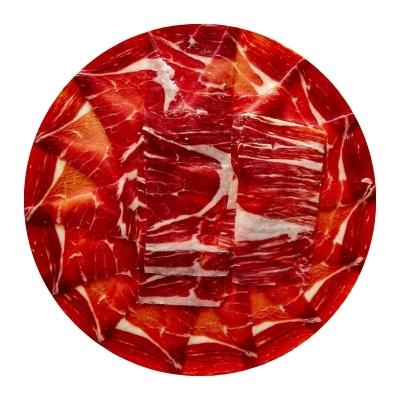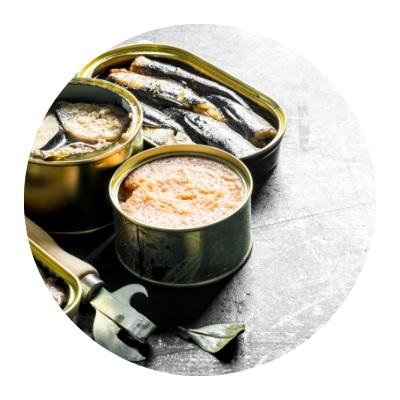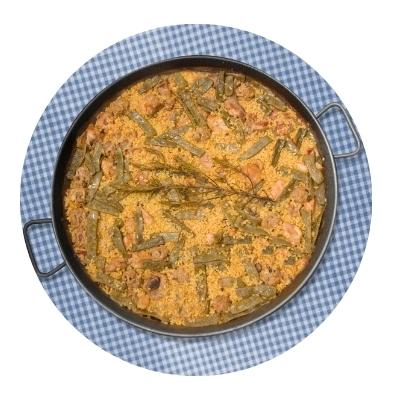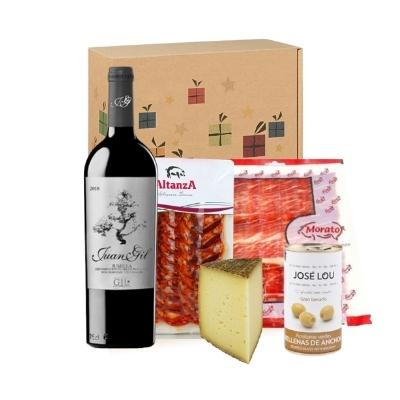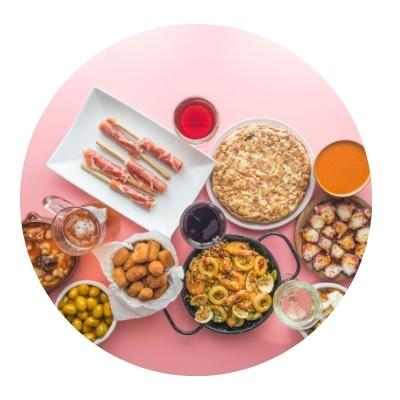Elegance and equilibrium in the Manchego cheese
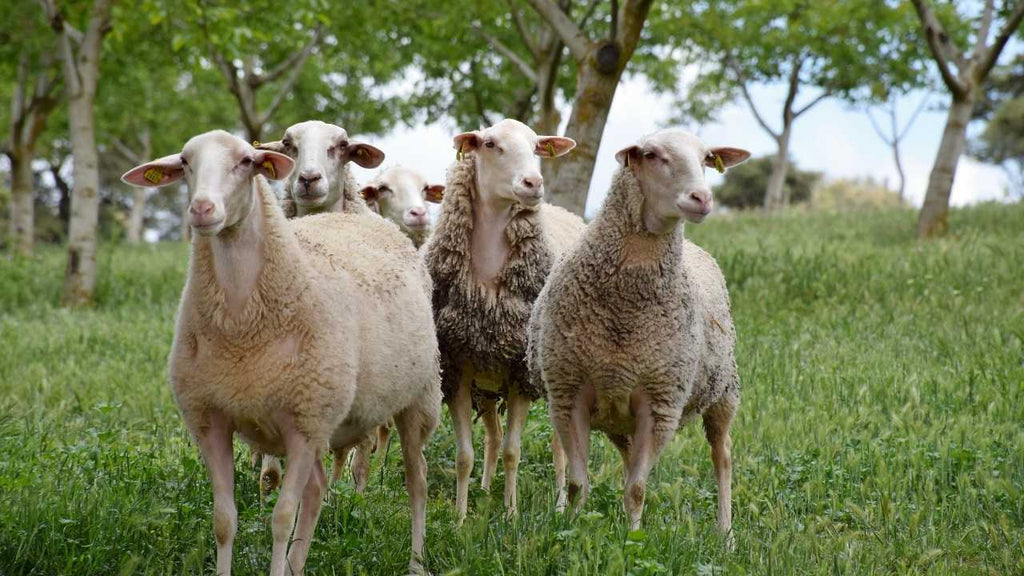
We're starting the new 2021 year with the outstanding “Manchego” cheese specialties ,which father Emilio and son Jesús Alonso mature to perfection in the hills south of Toledo (Castile-La Mancha) from the milk of their more than 2000 sheep and also refine with pimentón peppers, red wine or rosemary.
It is not only Miguel de Cervantes' milestone of world literature "Don Quixote" that begins with the famous words "In a place of La Mancha". In such a place (which, unlike the one mentioned in the novel, should nevertheless be remembered) in the seclusion not far from the village of Los Yébenes, some of the best sheep's cheeses in Spain have also been produced for only five years: They are the Alonsos' "Quesos", which have won several international awards. And I am fortunate to be able to taste them personally with the makers. While they give me an insight into their high art of cheese making, and reveal to me why their products belong to the absolute top class.
Here in the hills of Toledo, more than eleven kilometres from the nearest town, nature is pristine and almost untouched. At the end of January, the flora awakens with the winter sun, which gains strength every day, and sprouting grasses turn the land, which was still covered in snow two weeks earlier, a lush green. Jesús Alonso and his father Emilio welcome me warmly. Both are graduates in agricultural engineering. Emilio is an experienced specialist in livestock breeding, Jesús started producing cheese five years ago after graduating and is also in charge of marketing the farm's products.
On their farm "Pago del Valle de los Molinos"- Molinos in Spanish are the typical windmills, the archenemies of the novel character Quixote and at the same time emblematic of the central Spanish autonomous region Castila-La Mancha, which has been in the family for generations, father Emilio and son Jesús not only keep more than 2,000 sheep, and more than 600 young animals, which also find fresh alfalfa-clover, meadow herbs and, in summer, much sought-after shade under the walnut trees on their pasture.

Sheep in the shade of walnut trees
A synergy resulted from the walnut trees on the Alonso estate and the sheep, both of which would benefit from each other. The sheep do not eat the nuts or the bark of the trees, rather they eat away all the grasses and all the weeds around the trees. Thus, two sheep under a walnut tree also adorn the logo of the Alonsos. And walnuts are of course also part of the agricultural production, and - how could it be otherwise? - fine olive oils, mainly from the fruity-lovely Arbequina variety.
"Working with the animals is a genuinely nice job," says Jesús: "When it's a nice day. It is a profession that must also be a vocation," he knows. You simply must like it. The work 365 days a year would be overly complex, and it would be different to spend a sunny weekend in the pastures with the sheep, like I do, than to care for them day in and day out with the utmost professionalism. In addition, the breeding of horned cattle, or cattle-like animals such as cows, sheep and goats for milk production is also vastly different from breeding for meat production, Jesús continues. "Breeding for meat production is less sacrificial because you don't have to milk twice a day. At six in the morning, and again until six or seven in the evening."
Attentive readers of my Iberian Gourmet Travels may wonder why I have not been tasting Ibérico ham in the “Dehesas” of Extremadura as announced. The visit to the Alonsos was on the way, and what would not be a better accompaniment to a top-class raw ham than some of the top "Manchego" cheese they produce?
The cold front "Filomema", which put the capital Madrid and central Spain under a record blanket of snow in mid-January and brought nightly lows of well below minus ten degrees Celsius, also caused problems for the Alonsos. "I'm 1.85 metres tall, and the snow reached over my boots to my knee, so we had half a metre for sure," says Jesús. The electricity was out for days, and the generator, which is essential for businesses in rural Spain anyway, also broke down after piecework. "Luckily, it was only a few hours before the power connection was restored," says Jesús: "Only in the morning, because the generator broke in the middle of the milking process, we couldn't finish milking our sheep as usual." With the large number of animals, manual milking would be impossible anyway. "With over 2000 sheep, the use of milking machines is essential."

Over 30 years of family tradition
With Jesús and Emilio, 20 people work on the farm. Jesús compares a farm to the construction of a house: "Without supporting pillars, it collapses, and in our case the pillars are the livestock and agriculture." This is also the root of today's estate, "in what my father Emilio started more than 30 years ago". The Alonsos practice so-called "semi-intensive livestock farming", which also won an award at the 2019 industry fair Feria Internacional para la Producción animal in Zaragoza (short FIGAN).
The Alonsos' motto is no coincidence: "Cultivating quality from the source." Only milk from their own sheep goes into the family's cheeses; nothing is bought in, Jesús emphasises. The origin is therefore the animals, their environment, and their nutrition. And the motto, "From our sheep to their cheese", is also completely true. The sheep's stay in the pastures, all year round, is extremely important for the animals' well-being, Jesús knows. In summer, the sheep would spend the whole night outdoors, eating fresh grasses and juicy lucerne (or alfalfa), under the drip-irrigated walnut trees. And they would also "sleep far better than us humans" during heat waves in high summer, Jesús jokes. Only during the hot midday hours would the animals come into the barn and when they are to be milked. In winter, the animals would be outside during the day, and in the cold nights they would be sheltered in the heated stables. "Two years ago, we were awarded the title of one of the best livestock farms in Spain," Jesús says proudly: "Sustainability, respect for nature and the environment are our top priorities, but we are not an organic farm.”
The sheep's diet is a secret that the Alonsos want to be guarded. Jesús can only reveal this much: "We follow the diet of Ibérico pigs and imitate it, which consists mainly of acorns. Our sheep are fed a diet high in polyunsaturated fatty acids." You can taste that in the milk and eventually in the cheese. Besides the alfalfa and the herbs that the sheep also eat. "These fatty acids give our cheeses a balance of taste," Jesús emphasises.
At the same time, Jesús tells me a little detail on the side: "We don't have a D.O. designation for our cheeses as 'Manchego'." The reason: they keep Lacaune sheep, which originally come from southern France and the region where the blue cheese Roquefort is made. This would by no means be a drawback for the quality of the cheeses, but quite the opposite, as one can also taste. "But we produce our cheeses entirely 'Manchego'-style", Jesús underlines: "And everything is made by hand, 'artesano'", as it is called in Spanish, and which means a clear extra in quality. And I know from numerous D.O. regions in Iberia and Europe that the seal is by no means coveted by everyone, be it winegrowers who go further in terms of innovation or tradition than the commission's requirements dictate or allow.

It is all a question of time
Here is a little "cheese primer" for Spain: Cheeses are named according to their degree of maturation, "fresco" is, as its name suggests, a fresh cheese, pure white and only about two weeks old. "Tierno" not only literally means "soft" cheese, which has a maturation time of two weeks to just under a month. Jesús combines sheep's milk with walnuts in one of the "tierno" cheeses, the union of the symbiosis of animals and trees, in a cheese wheel is a delight that unfortunately cannot be exported by mail order at the moment. "Semicurado" are semi-mature cheeses, with an age of about two to three months. Matured "curados" are aged for four to seven months, añejos sometimes mature for a year or more. And Jesús' "Gran Reserva" is aged for as long as 18 months.
"We can't compete with industrial mass production," Jesús emphasises, so the quality simply must convince the customers. "First and foremost, this is done through the sensory qualities of the cheeses, followed by the natural production and the characteristics that come with it." Our cheeses are not "organic", but they are as natural as they can possibly be. They have a natural rind, for example, and are not waxed, wrapped in plastic, or even sprayed with antibiotics, as in mass production - "which would not be a health-promoting aspect either," says Jesús: "In the ripening process, our cheeses resemble mould balls," he explains vividly. The noble mould gives the Alonsos' cheeses an extraordinary complexity of flavours. This becomes abundantly clear on the palate. "It's not about boldness or sharpness in the taste, qualities that can also be achieved with additives," says Jesús: "The complexity reveals itself in numerous flavours that really blossom in the mouth."
"Balance", "equilibrium", are the words Jesús uses most often when talking about his cheeses, all the way to "elegance". At the same time, he emphasises that Valle de los Molinos produces cheese for the palates of the north, of Spain, but also from a European perspective. Because in the south of Spain, in Andalusia, Seville, Cadiz, Granada, and I speak from experience, cheese lovers tend to prefer strong, even pungent varieties. Goat's cheese, añejos, some preserved in olive oil and always matured for a long time. "We don't have that kind of cheese," he says: "In our cheeses, the flavour notes are balanced, and you can taste them. Even still in our añejo, which will be enjoyed by those who usually prefer shorter matured semicurados."

Rosemary, red wine, pimentón
"Over 90 per cent of our cheese production is made from raw milk, with the remaining ten per cent made from pasteurised sheep's milk, as this is what our customers want," says Jesús. In addition to the classics, Jesús, who sometimes spends months or even up to two years working on new creations, has also added new and well-known flavours to the range for Valle de los Molinos: cured in manteca (Ibérico-pork lard), curado in Rosemary Coat (Romero), curado Red wine (al vino tinto), en aceite (in olive oil), or a taste revelation: curado al Pimentón (dried paprika), strongly red on the outside, an "eye-catcher", distinctly good, it is the "humble one" of his cheese family, as Jesús calls it. The note that the paprika gives to the inside would be an extremely harmonious-round one, which I can only confirm. Yet the Pimentón is not only external, but also inserted, via so-called, pricked 'veins'. "The protagonist is the cheese, not the paprika," says Jesús: "What do you eat? Cheese or the flavour, be it truffle, paprika, 'black garlic', it is a balancing and tightrope act to perfect the matching. What it is all about in the end, of course, is the cheese."
He advises to present the red wine cheese to guests - which he calls his "baby", since it is Jesús latest creation, - with an open mind, because - and he is right - it's not the alcohol content that comes through, but rather the most pleasant aromas of the wine, which are in any case perfectly suited to matured cheese, and which come through extremely subtly: red berries, plum - or as I say as an Austrian, 'Zwetschke', cherry and even wood, leather and hints of tobacco. "It took me two years to find the perfect equilibrium between cheese and wine," says Jesús: "It's a delicacy that you should take the time to enjoy."

Rain of medals at the World Cheese Awards
The "Curado Artesano" was awarded "second best cheese" from a standing start on its first appearance at the Spanish Gourmets Quesos Competition ) and was awarded "Super Gold" at the "World Cheese Awards ". Silver and bronze were awarded to the mild-creamy semicurado, which was also the second-best goat's cheese in Spain in the Gourmet Quesos competition. The añejo (WCA Gold 2018 and Silver 2017) is among the 60 best cheeses in the world. And all these prizes after only five years that Jesús launched the cheese dairy in 2015.
Jesus is currently experimenting with Ajo negro, fermented black garlic that goes perfectly with curados, and black truffle is also one of his projects that will be in the assortment (and at Colono Gourmet) soon. There will be two more creations, but he is keeping them secret despite my persistent curiosity. "One will be extremely modern, the other is simply sensational", whereby the aim is always to preserve tradition and to focus on innovation in an avant-garde way. So, one can remain curious.
SHARE:
